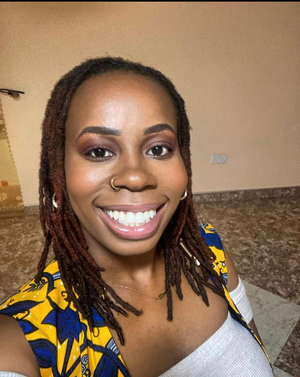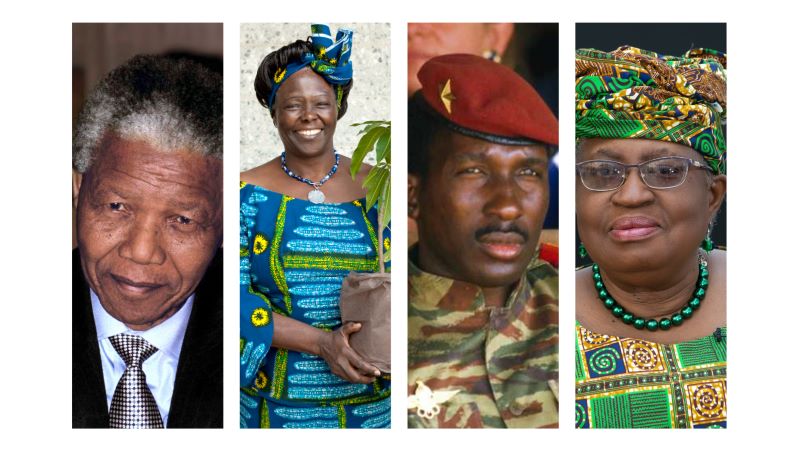The socio-political psyche of a post-colonial nation carries the burden of constantly negotiating a cultural paradox, one that entails indigenous and external values gnashing with friction. Hair politics in Ghana, for example, bear witness to the remnants of European values, with kinky hair ostracized and othered, and loosely textured hair patterns being preferred. In the Ghana school system, public school students are forced to cut their hair short because it is seen as a distraction, and although private schools in Ghana have more autonomy, some hold social and cultural values that are akin to mainstream Ghana institutions when it comes to hair. Interestingly enough, when White students enter the Ghana education system, they do not have to cut their hair.
The question of “respectable” hair and neo-colonialism through hair has come to light through a court case that has been making waves in the Ghanaian media. Early this year, Ras Aswad Nkrabea, a Jamaican repatriate, and Tereo Maghuay, a Ghanaian, both living in Ghana, took their sons to Achimota Senior High School (SHS), one of the leading senior high schools in the nation, for them to be enrolled. However, upon conversing with the Achimota SHS staff, the parents were told that although the boys were already accepted into the school, they would not be admitted into the school unless they cut off their dreadlocks.
FunTimes sat down with Ras Aswad Nkrabea, a Jamaican political activist, repatriate, and father of one of the young boys who were refused from Achimota SHS. This is his story.

(The two students, family members, and legal representatives at Ghana High Council. Tereo Maghuay dons a red hat and Ras Aswad Nkrabea wears white hat. Image provided by Ras Aswad Nkrabea.)
Q: You have lived in Ghana for over 20 years. In your opinion, has the country strived to create inclusion for African Diasporan expatriates/repatriates?
Nkrabea: Yes, I have been here in Ghana for over twenty years now. I would say they strive to accommodate us through a transition via the Ghanaian immigration system.
I would also equally say that there are no proper steps taken to provide for our social, economic, and political inclusion. This is what I consider as serious inclusion.
There are no bills in parliament for the “right of return”, which would give us the necessary legal status to restore our real citizenship, which we lost when we were kidnapped and forced into slavery in the west. Restoration means restoring everything we once had as citizens! This means that we have totally equal rights to live and participate and enjoy every aspect of our constitutional rights just like any Ghanaian born in Ghana.
Until this is done through a legislative instrument in the parliament of Ghana, I would say our inclusion is a fleeting illusion still to be attained fully.

(Ras Aswad Nkrabea and children. Image provided by Ras Aswad Nkrabea.)
Q: How would you describe the neo-colonial politics of hair in Ghana?
Nkrabea: Shocking! Frightening! Oppressive! Denigrating! Discriminatory! Prejudicial! Low self-esteem! There’s an inferiority complex and a total lack of political leadership to confront the Eurocentric value system and imposition of the churches on the Ghanaian African population.
Q: How does Ghanaian society perceive dreadlocks and people who are Rastafarians?
Nkrabea: Traditionally they call it “MpesMpese”which was meant to be seen as a holy sacred symbol. However, due to the imposition of the White racist Mission Churches, and school prejudicial agenda to impose White Christian indoctrination, values, lifestyle, and religious ideology, it is now seen as evil and negative.
Rastafari introduced it in the Ghanaian system as “Dreadlocks” which represents pride in our naturality, resistance, defiance, rebelliousness and a threat to the status quo. It also represents trendy fashion statements of pride, and appreciation for African natural beauty.
Ghanaians, poor people, and the ghetto youth have high regard and respect for Rastafari through the many positive messages from reggae music. Most of what the Ghanaian population knows about Rastafari came from reggae music.
Rastafari is greeted daily by positive words such as righteous, respect, and honour. It is the upper-class who are showing disdain, scorn, and all manners of expressions that shows their prejudice and discrimination.

(Dr. Obadele Kambon speaks about the Achimota case. Image provided by Ras Aswad Nkrabea.)
Q: Kindly provide a brief overview of the moments that led to the Achimota School case, and the progress that has been made.
Nkrabea: My son was selected by the computer system to be admitted in the Achimota Senior secondary school, and on the 18th of March, 2021, when we took him to be enrolled and begin his classes a few days ahead, we were told by several staff members that the school will not accept him with his locks! We were astonished because this is not the first school we enrolled him in and we never had this problem before.
However, we ignored them and proceeded to see the headmistress who had no time to attend to our concerns. This made us rather go to the assistant headmaster, who told us that no matter what we say or do they won’t accept him unless he cuts off his locks. He went further to say that this is not the first and won’t be the last, so we can take it to court because they have been taken to court before and the parents and the student lost.
This was when I realized that I was up against the very arrogant and condescending leadership of the school. I then sent my protest to the media seeking constitutional interpretation of the laws of Ghana. From here social media was the next vehicle, and gave it massive exposure from all over the world.
Today we are in court waiting for interpretation and judgment, plus justice.
Q: Where do you see the future of Ghana’s relationship with the African diaspora heading?
Nkrabea: It is very dim at the moment because the Diasporans are not united, proactive enough, vocal enough, or economically strong collectively. Equally, the government is not a Panafrican government, nor do they have the political will necessary to ensure the Diasporans are properly reintegrated.
Q: How can people support your case?
Nkrabea: Support can be given through sharing the information, finding scholarships for these two boys, and supporting and boosting the GoFundMe efforts.
Q: Is there anything else you would like to add?
Nkrabea: African returnees must begin to have a continental view rather than a nationalistic view in these shall nation-states.
Nkrabea and his team have created the MAAT Justice and Unity Foundation to carry on future advocacy for rights and justice. Check out their work on Twitter at @AndMaat, and learn about their GoFundMe campaign here.

Nana Ama Addo is a writer, multimedia strategist, film director and storytelling artist. She graduated with a BA in Africana Studies from the College of Wooster, and has studied at the University of Ghana and Kwame Nkrumah University of Science and Technology. Nana Ama tells stories of entrepreneurship and Ghana repatriation at her brand, Asiedua’s Imprint ( www.asieduasimprint.blog ).





